Lemon balm (Melissa officinalis) or balm mint is a perennial plant in the mint family. It is native to South central Europe, the Mediterranean basin, Iran and central Asia, but now is naturalized in the Americas. It is also sometimes planted in permaculture gardens and used by many gardeners as a culinary addition.
For more than 2000 years this herb has been cultivated as a culinary and medical plant. It is regarded as a calming herb, and traditionally used to combat anxiety, stress, and insomnia, to treat wounds, ease indigestion and to stimulate the appetite.
The Greeks called lemon balm “melisophyllon” which marries the word melissa meaning honey bee and phyllon” for leaf. The Romans knew the plant as apiastrum” from apias, to simply mean “bee”. It is accurate to say that the lemon balm plant is certainly loved by bees!!
In classic literature, lemon balm was added to wine to use as a treatment for various illnesses like high fevers. World renowned herbalist Rosemary GladStar, talks of a good friend of hers, Adele, who would meet you in the door step with a tray of green gleaming glasses filled with her daily “remedy” lemon balm tea. It was rumored her daily tea, with a lemon slice and a little honey, allowed her to live well into her late 90’s, following the footsteps of Llewelyn, the 13th century Prince of Glamorgan, who drank lemon balm tea every day and lived to the ripe old age of 108.
To this day lemon balm is known as long life lemon balm. It is said drinking a daily tea, the spirit of this plant will bless you with long life.
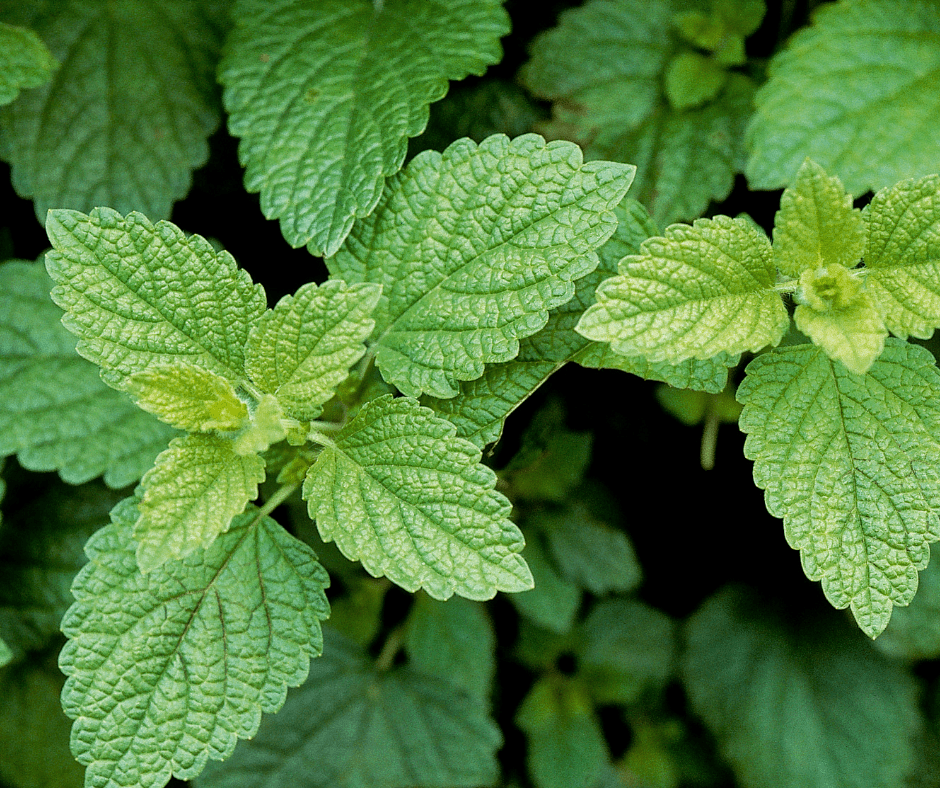
Medicinal benefits of Lemon Balm
Anxiety: Anxiety is a disorder that refers to feelings of fear, worry, and nervousness strong enough to interfere with daily activities. Anxiety is the most common mental illness in China, Japan, Russia and the United States. In total, hundreds of millions are affected.
Anxiety is frequently treated with medications. However, many have sought alternatives due to fear of medication side effects. There are several studies showing that lemon balm may reduce anxiety symptoms. Increasing the brain chemical called GABA (gamma-aminobutyric acid) plays a major role in the treatment of anxiety. A 2017 study in Phytotherapy Research analyzed the effects of lemon balm on GABA pathways. Lemon balm was found to improve GABA effectiveness, similarly to how medicinal drugs interact with the GABA system to help treat the disorder.
An article published in 2016, also looked closely at the compounds that make up lemon balm and concluded that it contains GABA stimulating receptors. A third study showed that the presence of rosmarinic acid in lemon balm is responsible for helping reduce symptoms of anxiety. Overall, these research studies show that lemon balm may be used as a safe and effective source in treating anxiety.
Depression: Depression is a mood disorder associated with feelings of sadness and loss of pleasure in life. It can become so severe that it can lead to suicide. Worldwide, millions are affected by depression, which can occur in anyone, at any age and from any background. The most common known treatments include antidepressant medications, which increase levels of serotonin, a chemical (neurotransmitter) that helps send signals from one brain cell to the other. Researchers believe that an imbalance or reduction of serotonin levels is what increases feelings of depression. In a study conducted on rats, it was found that lemon balm contains serotonergic activity. Rats that received water with lemon balm extract, showed “significantly reduced depressive-like behavior when compared to rats that received a placebo. This suggests that lemon balm may play a role in helping with depression symptoms.
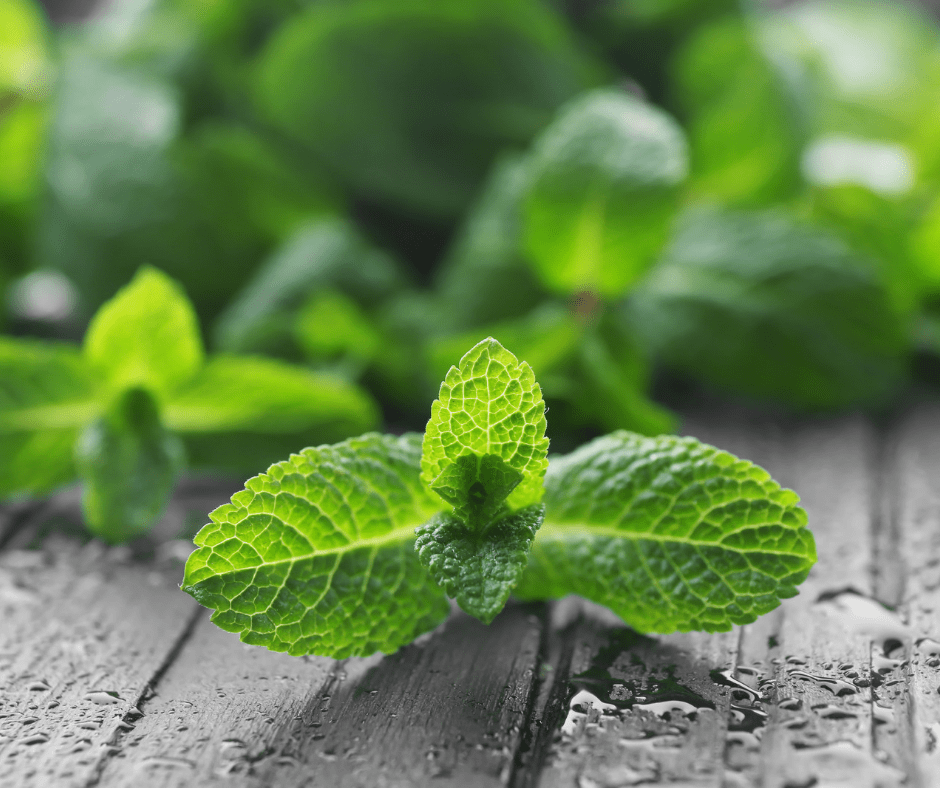
Stress and insomnia: Stress is a feeling of strain and pressure that’s a natural part of life. While almost every human being has experienced stress, it can lead to chronic illnesses and disease if not managed correctly Excessive cortisol, the hormone responsible for stress, is expressed in the brain for long periods of time, causing a drop in white blood cells and leading to a weaker immune system. This makes one more susceptible to diseases, including colds and other infections.
One of the primary actions of lemon balm, and what it is most known for, is its mild sedative effect, which can help those who are stressed. In a study published in the Journal of Evidence-Based Complementary and Alternative Medicine, children under the age of 12 who suffer from restlessness and insomnia were treated with a combination of valerian root extract and lemon balm extract. It was found that this mixture of herbs relieves stress and helped in treating insomnia.
The soothing effect of lemon balm has also been studied in mice. Two researchers, Hajhashemi and Safaei, set out to study the ehypnotic effect of lemon balm. They found that mice injected with lemon balm and lavandula angustifolia extract fell asleep quicker and slept longer. The results of the study support that when lemon balm is combined with other herbs, it can be helpful in treating insomnia.
Viral Infections: Consumers increasingly prefer the use of plant extracts, including lemon balm, to help prevent some infections. Research has revealed that the plant contains compounds such as eugenol, terpenes, and rosmarinic acids, chemicals that play a role in killing viruses and bacteria. Specifically, evidence suggests that lemon balm contains high activity against herpes simplex virus (HSV), which causes cold sores.
The University of Maryland Medical Center published a study that looked at the medicinal uses of lemon balm. Dr. Steven Ehrlich reported that in a study of 116 people with cold sores from oral herpes, those who were given a lemon balm cream to apply to their lips experienced improvement of their symptoms after only two days. In a different study, a German dermatology clinic reported lemon balm as the primary source of treatment for the herpes virus without any recurrence noted.
Furthermore, a recent study from 2017 confirmed that lemon balm has antibacterial ability against many bacterial strains, including the most common bacteria, known as E. coli. This research suggests that the use of lemon balm is very effective for both genital and oral herpes through its antiviral properties in addition to antibacterial properties.
Antioxidants: Naturally found in many plant-based foods and herbs, antioxidants are important substances that inhibit oxidation, the production of free radicals that damage cells. In other words, antioxidants are good for us because they stop or prevent cell damage.
Various studies have confined the antioxidant effects of lemon balm. In one study that analyzed the anticancer properties of lemon balm, it was found that lemon balm presents with high concentrations of flavonoids, a class of chemical compounds that contain phenols known to be powerful antioxidants. Shahrekord University of Medical Sciences in Iran published an article that focused specifically on evidence-based properties of lemon balm. It investigated, in detail, the antioxidant effects of the herb and supported the previous claim that the antioxidant activity in lemon balm is mainly attributed to the phenolic compounds in the plant.

Indigestion: Many suffer from indigestion, a pain or discomfort in the upper abdomen. It is often a sign of another condition such as GERD, ulcers, gastritis or sometimes irritable bowel syndrome. Research has shown that herbs such as lemon balm, peppermint, and chamomile have alleviating effects on indigestion. In one study, 120 patients with indigestion were randomly selected to either receive an herbal preparation which contained lemon balm extract or to receive the placebo. Those who received the herbal preparation reported reduced intensity and improved indigestion symptoms. In France, about 40 plants have been approved to be safely used as teas to help treat indigestion, including lemon balm.
Cancer: A study published in an article from 2015 found that lemon balm has anticancer properties. The study focused on cancer activity of human breast cancer cells. It proved that, due to its powerful antioxidant capacity, cardioprotective effect and anti-inflammatory properties, it may potentially enhance treatments for cancer.
Cognitive performance: It has been proposed by some scientists that lemon balm has enhancing effects on cognitive behavior. In an article in Pharmacology Biochemistry and Behavior, 20 participants were treated with different doses of lemon balm extract. The findings showed improvement of attention when 600 mg of lemon balm was taken by participants. In a more current study from 2016 found in Iranian Journal of Medical Sciences, it states lemon balm showed improving effects on memory and the treatment of Alzheimer’s disease in clinical trialsâ€.
Countless studies confirm that lemon balm or the combination of lemon balm with other extracts has the ability to improve memory and attention. Neurologists have tested the efficacy and safety of lemon balm in patients with mild to moderate Alzheimer’s disease and found that it is of value and has positive effects in managing the disease.
Thyroid disorders: Phenolic acids and other compounds found in this versatile herb appear to be responsible for Lemon Balm’s thyroid-regulating actions. Test tube studies have found that Lemon Balm blocks the attachment of antibodies to the thyroid cells that cause Grave’s disease (hyperthyroidism). The brains signal to the thyroid (thyroid-stimulating hormone or TSH) is also blocked from further stimulating the excessively active thyroid gland in this disease.

Culinary uses: The leaves of lemon balm have the scent and taste of lemon with a hint of mint. There are many culinary uses due to its unique taste. Try cutting up lemon balm leaves and adding them to your favorite poultry dish, salad, or soup. Lemon balm goes nicely with chicken and fish dishes. It can also be used to garnish delicious desserts.
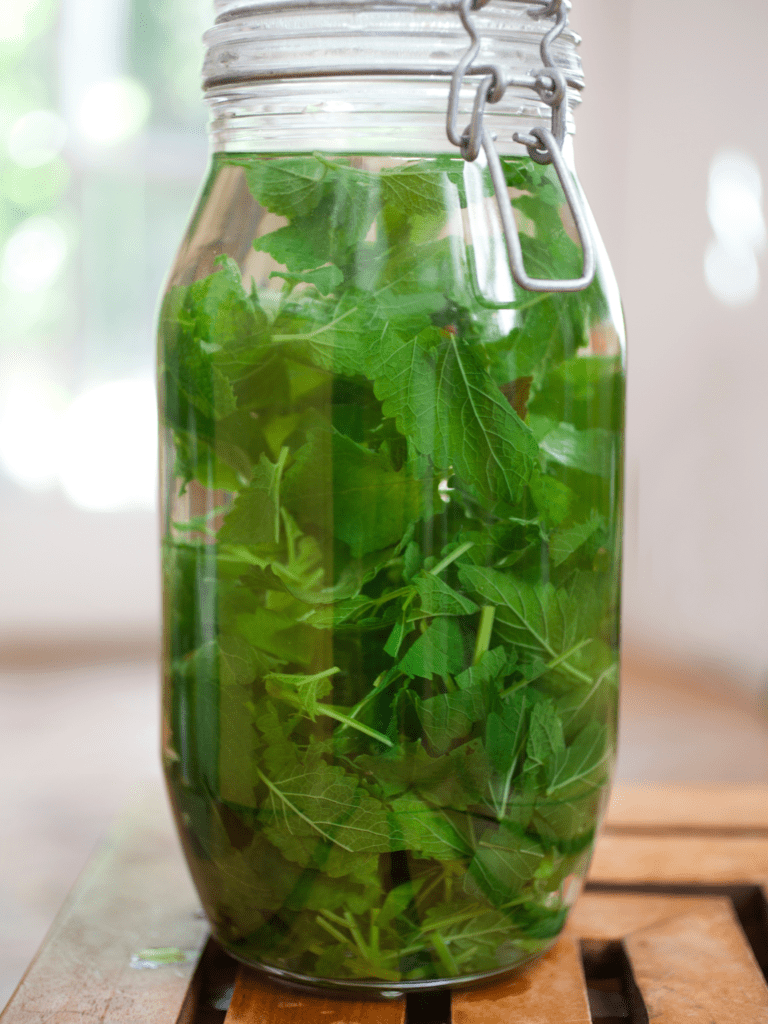
How to use
You can use lemon balm in several different ways to receive its medicinal benefits.
Tea: First is the most basic of all remedies, an herbal tea. Try mixing lemon balm with other tasty herbs such as holy basil and chamomile.
Lemon balm tea
• 1/4 cup fresh lemon balm leaves chopped or 2 – 3 teaspoon dried
• 1 cup water
• 1 teaspoon raw local honey (optional)
Steps
1. Chop the lemon balm leaves to release their oils. Set aside.
2. Heat the water in on the stove until boiling.
3. Mix the leaves and water in a mug and allow to stand 10 minutes to steep.
4. Stir in honey and strain if desired. Drink warm.
Tincture: A tincture is a liquid extraction of the medicinal properties of plants, infused into alcohol. Tinctures are effective and efficient and taken by the dropper full. If you have never made a tincture, follow our step-by-step guide which will walk you through the process, doses, etc.
For those not interested in making their own tincture, HealthPrimitive offers a Lemon Balm Elixir, packed full of these amazing qualities.
Salve and ointment: Because lemon balm is good for wounds, skin issues and cold sores, it makes an effective topical treatment. Turn lemon balm into a salve or chapstick for convenient application. If you are new to making salve, you can follow our step-by-step guide here.
Lemon balm has the potential to cause the following side effects:
• Headache
• Painful urination
• Increased body temperature
• Nausea, vomiting & stomach pain
• Dizziness
• Wheezing
• Skin irritation
• Allergic reaction
You may be able to minimize side effects, such as stomach upset, by ingesting lemon balm alongside food. You can also reduce your risk for side effects by consuming fewer than 2 grams of lemon balm per day.Lemon balm should only be used for a short period of time. A general rule of thumb is to take one week off after every three weeks of use. You shouldn’t take lemon balm for longer than four months at a time without a break.
• Glaucoma medications
• Thyroid medications
• Barbiturates
• Sedatives
• Drugs that affect serotonin
• You have a scheduled surgery
It’s always a good idea to talk to your doctor 1st. If you are taking any medications or are pregnant or nursing. View our disclaimer here.
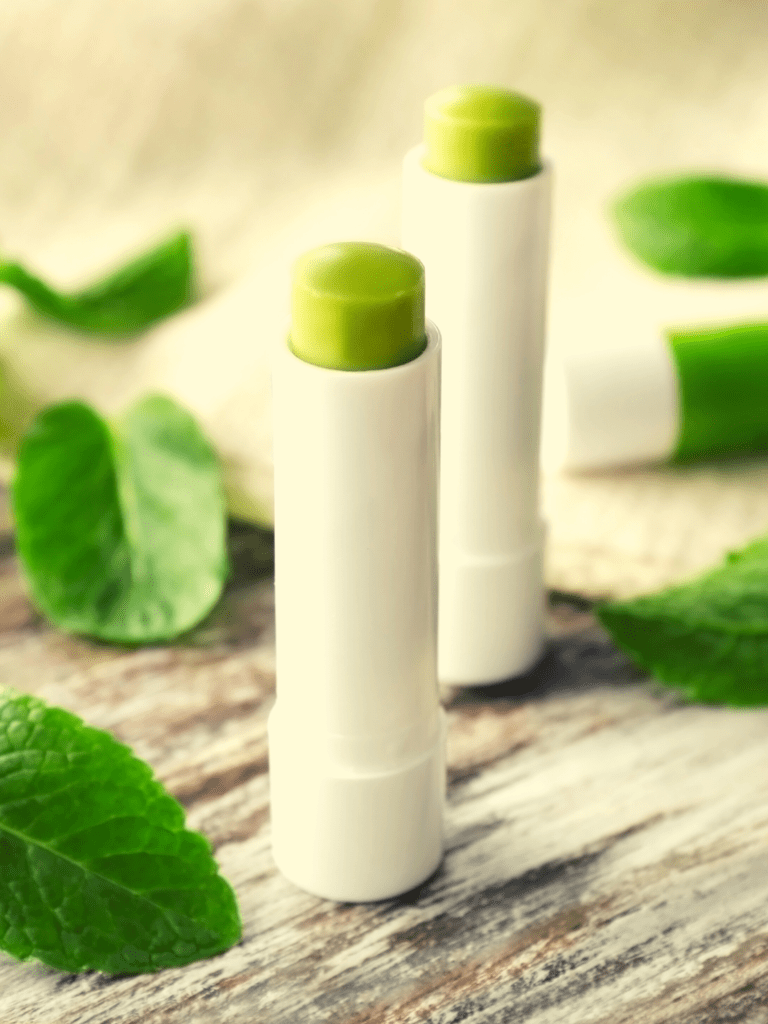
Final thought
There are many good reasons to start using lemon balm. Its medicinal properties make it a valuable herb to add to any botanical apothecary.
My theory as to why people who drink lemon balm live a long healthy life is due to the way this plant calms the nerves and eases stress. After all, stress is one killer and biggest threat to our health.
Stay Wild
Sources below
Savage K, Firth J, Stough C, Sarris J. GABA-modulating phytomedicines for anxiety: A systematic review of preclinical and clinical evidence. Phytotherapy Research.
2018;32:3–18. Abolfazl Shakeri, Amirhossein Sahebkar, Behjat Javadi, Melissa officinalis L. – A review of its traditional uses, phytochemistry and pharmacology, Journal of Ethnopharmacology, Volume 188, 2016, Pages 204-228, ISSN 0378-8741
Shih-Hang Lin, Mei-Ling Chou, Wei-Cheng Chen, Yi-Syuan Lai, Kuan-Hung Lu, Cherng-Wei Hao, Lee-Yan Sheen, A medicinal herb, Melissa officinalis L. ameliorates depressive-like behavior of rats in the forced swimming test via regulating the serotonergic neurotransmitter, Journal of Ethnopharmacology, Volume 175, 2015, Pages 266-272, ISSN 0378-8741
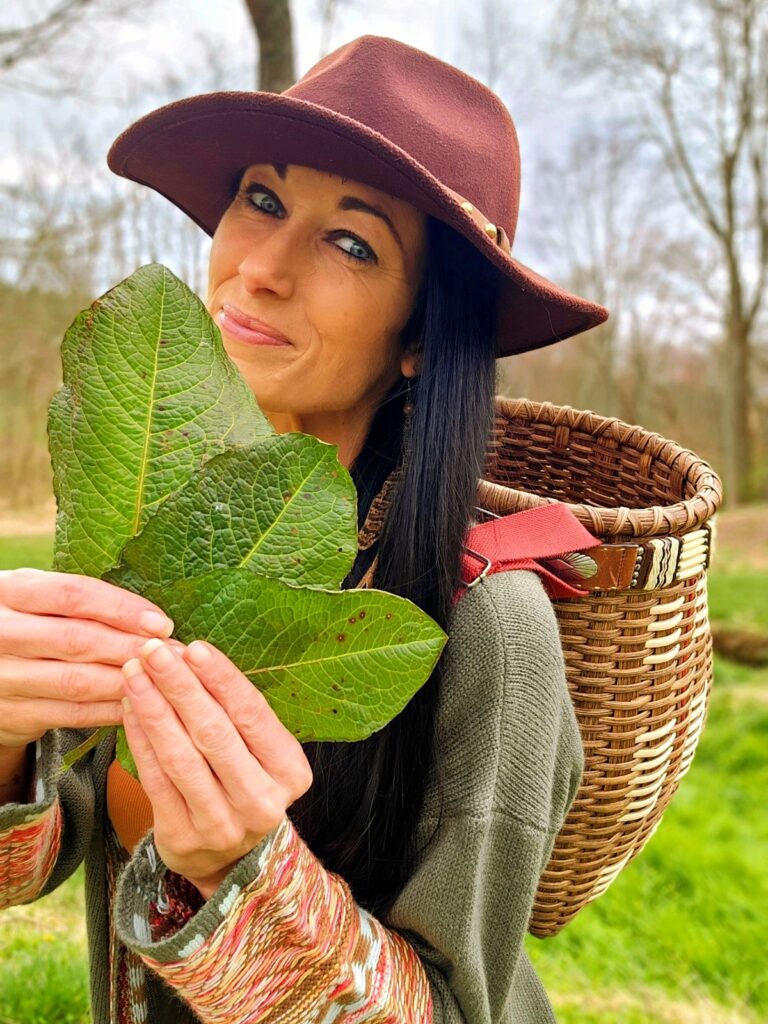
Kayce Heister
Kayce is a Clinical Herbalist, Naturopathic Practitioner (HHP), Active Forager, Wild Food Chef and Mother of three. She has spent the last 20 years practicing herbalism and natural health, and spends most of her time educating others on the amazing potential the natural world can offer.